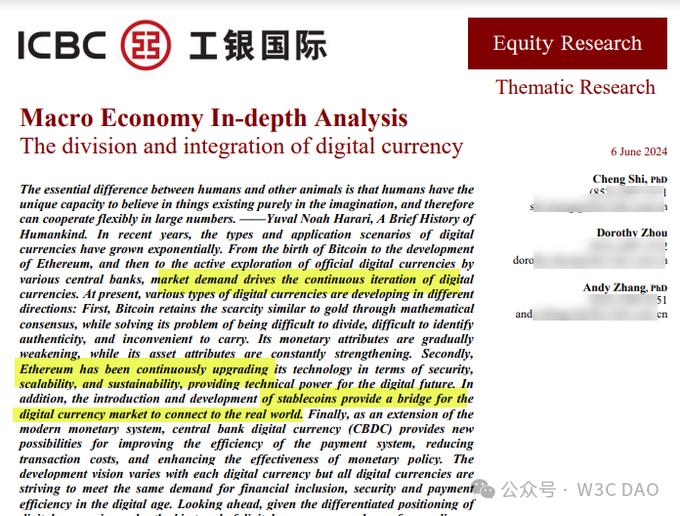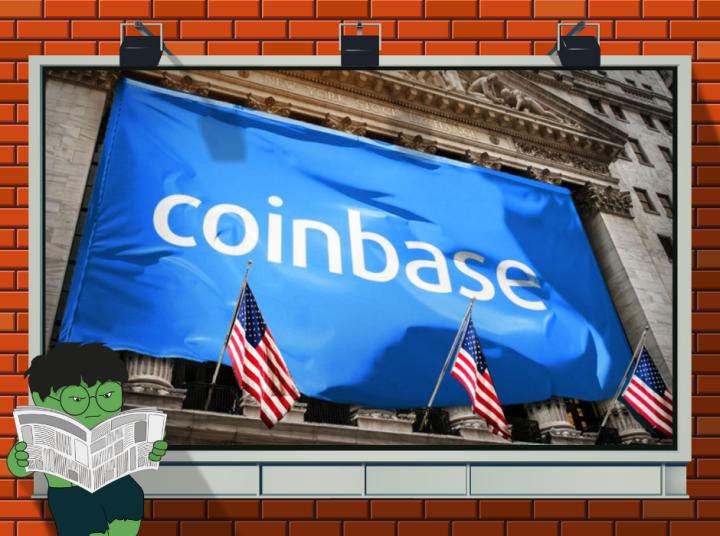The Industrial and Commercial Bank of China (ICBC) has rarely praised the evolution of Bitcoin and Ethereum as innovative financial assets. The bank's analysis report highlights the rapid development and increasing diversification of digital currencies, comparing Bitcoin to gold and viewing Ethereum as "digital oil."
The ICBC report emphasized that, as historian Yuval Noah Harari pointed out, human imagination is the driving force behind the exponential growth of digital currency types and applications.
“Chinese state-owned banks continue to write love letters to Bitcoin and Ethereum,” said Matthew Sigel, head of digital asset research at VanEck. The ICBC report outlines different development paths for various digital currencies, each of which addresses unique needs in the financial ecosystem.
innovation
The report mentioned that from the birth of Bitcoin to the progress of Ethereum and the exploration of central bank digital currency (CBDC), market demand has driven innovation in the field of digital currency.
ICBC said Bitcoin has successfully maintained scarcity similar to gold through its mathematical consensus mechanism. The flagship cryptocurrency has solved issues related to divisibility, authenticity verification, and portability. The report adds that while Bitcoin’s monetary properties are weakening, its status as an asset is strengthening.
At the same time, Ethereum provides the "technical power of the digital future" and positions itself as the "digital oil" capable of powering countless applications across the Web3 ecosystem.
Ethereum, unlike Bitcoin, incorporates Turing completeness through its proprietary programming language Solidity and its virtual machine EVM.
This feature allows developers to build and manage complex smart contracts and applications, positioning Ethereum as a key platform for decentralized finance (DeFi) and non-fungible tokens (NFT). The report also acknowledges Ethereum’s potential to extend its reach to decentralized physical infrastructure networks (DePIN).
Despite its potential, Ethereum faces some practical challenges, including security vulnerabilities, scalability issues due to high computing requirements, and significant energy consumption. Ethereum developers are exploring various solutions to address these challenges.
The Ethereum 2.0 upgrade introduced the Proof of Stake (PoS) consensus mechanism and sharding technology to improve network throughput and sustainability. In addition, developers are working on Layer 2 solutions such as state channels, sidechains, and rollups to improve scalability.
The key to stablecoins
The report also highlights the critical role that stablecoins play in bridging the gap between digital currency markets and the real world. Stablecoins provide stability to the volatile cryptocurrency market by tying their value to traditional assets such as fiat currencies.
ICBC stated that stablecoins can facilitate seamless transactions and provide reliable storage of value, making them an important tool for daily financial activities and a bridge for integrating digital currencies into the global financial system.

In addition, central bank digital currency represents a major innovation in the modern monetary system. By digitizing fiat currencies, central banks can improve the efficiency of payment systems, reduce transaction costs, and enhance the effectiveness of monetary policy.
The report states that central bank digital currencies can simplify cross-border transactions, reduce reliance on intermediaries, and provide greater financial inclusion by providing digital financial services to the unbanked.
The report notes that the development and implementation of central bank digital currency infrastructure requires careful consideration of privacy, security and regulatory implications to ensure its success and widespread adoption.
Other digital currencies
The report concluded that although each digital currency has a different development vision, they all aim to improve financial inclusion, security and payment efficiency. As digital currencies continue to evolve, developers and policymakers need to focus on balancing sustainability, security, and efficiency.
Forbes headlined an article at the beginning of the week: "A very big opportunity, after Bitcoin, Ethereum and Ripple (XRP) prices skyrocketed, cryptocurrencies are suddenly preparing for a huge China earthquake."
According to reports, in recent months, Bitcoin prices have exceeded previous historical highs, once climbing to more than $70,000, helping the price of Ethereum to triple, and Ripple to rise by nearly 50% since the low in 2022.
at last
Now, with the U.S. Federal Reserve quietly acknowledging that gold is replacing the U.S. dollar, Bitcoin and cryptocurrency investor Brock Pierce says it’s only a matter of time before China reopens the digital door to cryptocurrencies after a 2021 crackdown that sent Bitcoin prices tumbling .
The article mentioned that Pierce said in an interview with the South China Morning Post (SCMP): "Will China open (cryptocurrency)? I think it is inevitable. The question is not if, but when."
10 years ago, Pierce co-founded Tether, the world's largest U.S. dollar stablecoin USDT issuer, in Hong Kong.
He said he was "passionate about what is happening in Hong Kong." Hong Kong, a special administrative region of China, recently followed Wall Street’s lead and approved a number of Bitcoin and Ethereum spot ETFs.
Last month, attendees at the Hong Kong Bitcoin Conference fueled speculation that the much-hyped Hong Kong Bitcoin spot ETF might eventually be opened to mainland Chinese investors.







